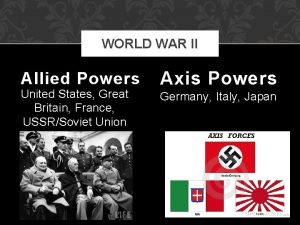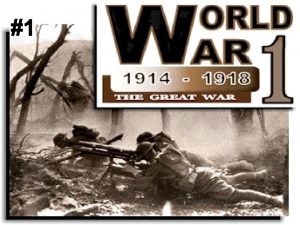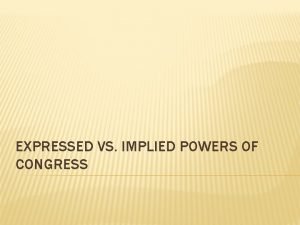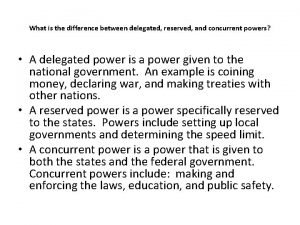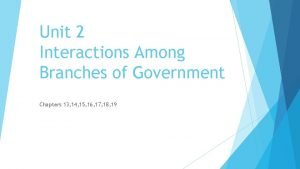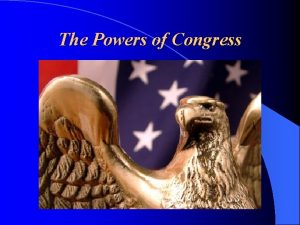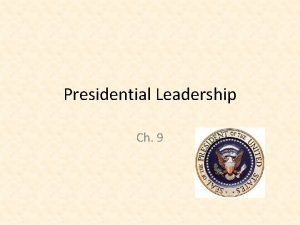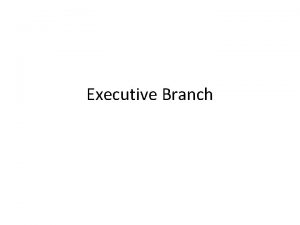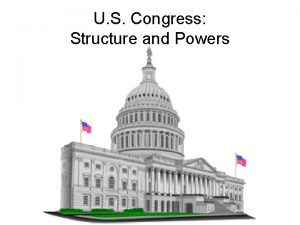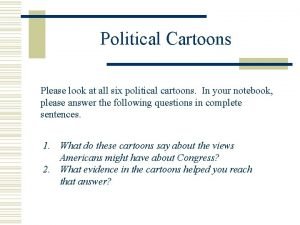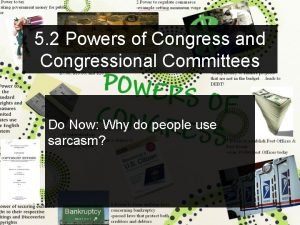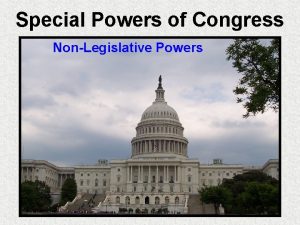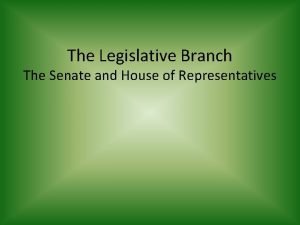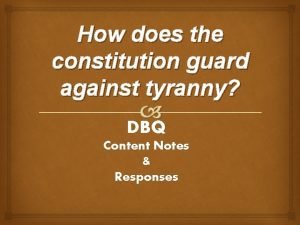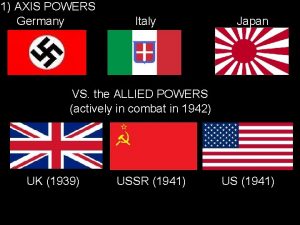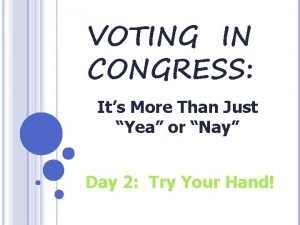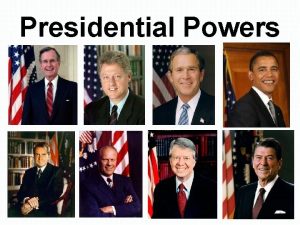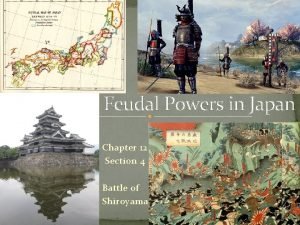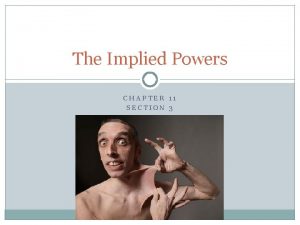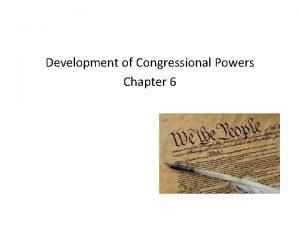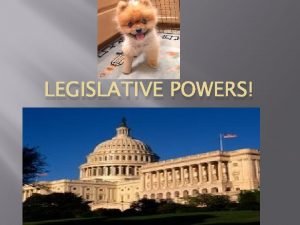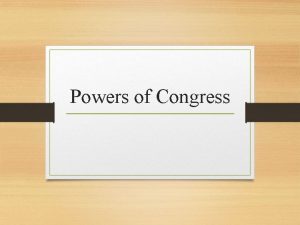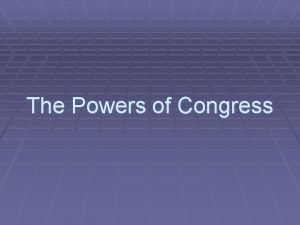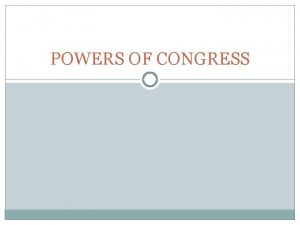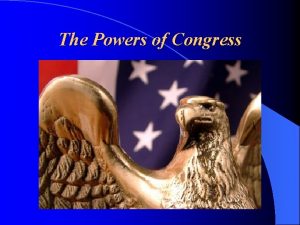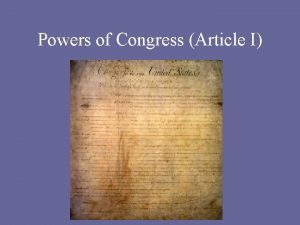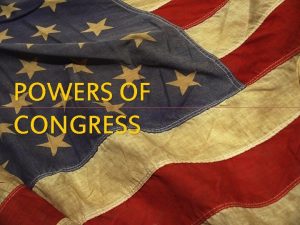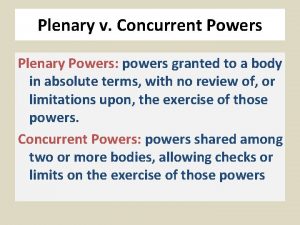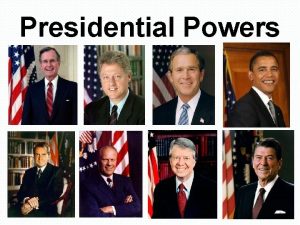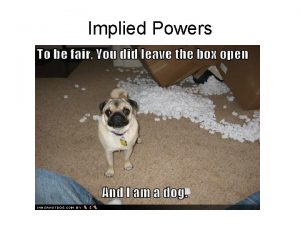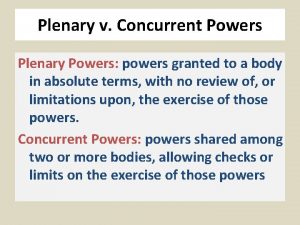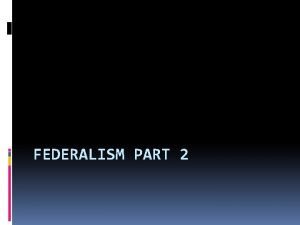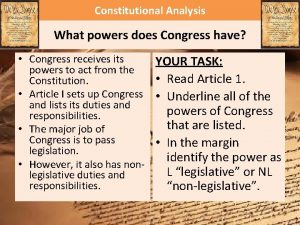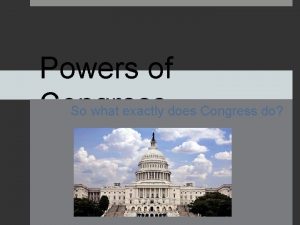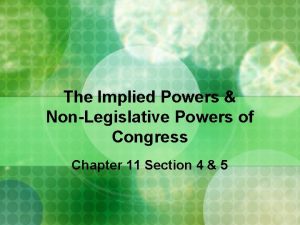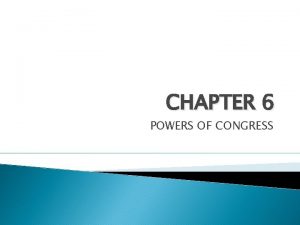Powers of Congress Chapter 11 Where Does Congress

































- Slides: 33

Powers of Congress Chapter 11

Where Does Congress’ Power Come From? n Congress gets all of its power from Article I of the U. S. Constitution

Powers of Congress n Congress has 3 kinds of power: n Expressed – directly written in the Constitution n Implied – reasonably assumed based on the expressed powers n Inherent – nowhere in the Constitution, but always held by national governments

Interpreting the Constitution n How much power Congress has depends on how we interpret the Constitution n There are two major “schools of thought” on how much power Congress should have

Interpreting the Constitution n Strict Constructionist (originalist)– believe that Congress should only have the expressed powers and no more n Support very limited government n Believe that individual liberty is most important n First SC was Thomas Jefferson

Interpreting the Constitution n Liberal Constructionist (living constitution) – believed that we should interpret the Constitution loosely, so that Congress could have more power n Support an active government n Believe that governmental effectiveness is most important n First LC was Alexander Hamilton

Powers that Both Houses use Together n Powers of Money and Commerce n Power to “lay and collect taxes” n. Cannot tax for private benefit n. Cannot tax exports n. Federal tax rates must be the same in all states

Two Kinds of Taxes n Direct Tax – paid by the person it is imposed upon n. Income tax, Property tax

Two Kinds of Taxes n Indirect tax – imposed on one person, but paid by another n. Cigarette Tax, Gas Tax

Deficit n Powers of Money and Commerce n Power to “borrow money on the credit of the United States” n Deficit – money spent exceeding tax revenue, must be borrowed this year to pay our bills (2009 -1. 4 trillion, 2010 -1. 3 T, 2011 -1. 3 T, 2012 -1. 1 T, 2013 -680 billion) n Borrowed by selling bonds

Debt n Powers of Money and Commerce n Power to “borrow money on the credit of the United States” n Debt – total of all deficits yet to be paid back, plus interest owed ($17. 5 trillion) (2010 -13. 5 trillion, 2000 -5. 6 trillion, 1990 -3. 2 trillion, 1980 -907 billion) nhttp: //www. usdebtclock. org/ http: //www. treasurydirect. gov/NP/ BPDLogin? application=np

Powers that Both Houses use Together n Powers of Money and Commerce n Power to “regulate commerce. . . among the several states” n Power is often extended to do seemingly unrelated implied powers n Build interstate highways n Ban racial discrimination

Gibbons v. Ogden, 1824 n New York had given Robert Fulton exclusive rights to operate a steamboat on the Hudson River n Fulton gave Ogden a permit to operate the steamboat for him n Gibbons had a license from the U. S. government to operate a steamboat in the same area

What are the Constitutional Issues? n Whose permit is supreme? n What does “commerce” mean?

In to Save the Day…

Gibbons v. Ogden, 1824 n The court decides to interpret “commerce” very broadly n “Commerce” means virtually all commercial interactions n Thus, Congress can regulate just about anything

Powers that Both Houses use together (concurrent power) n Powers of Money and Commerce n Power to “coin money and regulate the value thereof” (legal tender) n Power to “establish uniform laws on the subject of bankruptcies” n Bankruptcy – person declared incapable of repaying debt, debts are cleared

Expressed Powers: Foreign Relations n n Congress has the power to declare war However, they have abdicated the power to wage war to the president

How Congress Lost This Power Congress passed the Gulf of Tonkin Resolution, allowing the Pres. to use troops without Congress’ permission n Tried to take power back with War Powers Resolution (1973) n

Other Expressed Powers Naturalization – setting the rules to become a citizen n Postal Power – Congress sets up the Post Office n Copyrights and Patents n Weights and Measures – making sure they mean the same thing nationwide n

Other Expressed Powers Power over territories – Congress controls territories, and decides whether they become states or not n Eminent Domain – Congress can take private property for public use n Judicial Power – Congress sets up the court system n

Implied Powers n Necessary and Proper Clause – Where the implied powers come from, Article I, Section 8, Clause 18 n Tells Congress they can make any laws “necessary and proper” for carrying out their expressed powers

Mc. Culloch v. Maryland (1819) First case that tested the Necessary and Proper Clause n Congress created a national bank, and Maryland hated it n Maryland placed a tax on all national bank transactions to try and put it out of business n

In to Save the Day…

John Marshall and the Court Say: Any laws Congress passes, so long as they hold to the spirit of the Constitution, are okay n This is a liberal constructionist position n Since this case, Congress has used many implied powers n

Nonlegislative Powers Propose Constitutional Amendments with 2/3 vote in both houses n House of Reps. chooses the president if no candidate gets a majority in the electoral college n Senate chooses vice-president n

Nonlegislative Powers n Impeachment – means to bring criminal charges against n Impeachment requires majority vote in the House

Nonlegislative Powers n After House votes, trial begins n Chief Justice acts as judge, Senate acts as jury

Nonlegislative Powers n. A conviction, which would remove the president from office, requires a 2/3 vote in the Senate

Acquit - is when people are found not guilty after they are impeached. n. Andrew Johnson was acquitted by one vote. n. Nixon Resigned before the trial. n. Clinton was acquitted.

Successor n. Is a replacement or someone to fill the vacancy, which is subject to a majority vote in both houses of Congress. n. Has been used twice, Ford in 1973 and Rockefeller in 1974.

Executive Powers n Appointment President appoints officials with majority approval of Senate –

Executive Powers n Treaties – President makes treaties, but Senate must approve with 2/3 vote
 Chapter 11 powers of congress
Chapter 11 powers of congress Was the united states on the axis powers or allied powers?
Was the united states on the axis powers or allied powers? Central powers wwi
Central powers wwi Implied vs expressed powers
Implied vs expressed powers Enumerated vs implied
Enumerated vs implied Expressed powers vs implied powers
Expressed powers vs implied powers Difference between delegated reserved and concurrent powers
Difference between delegated reserved and concurrent powers Congress formal and informal powers
Congress formal and informal powers Interactions among branches of government
Interactions among branches of government Non legislative duties of congress
Non legislative duties of congress Chapter 9 presidential leadership
Chapter 9 presidential leadership Non legislative powers of congress
Non legislative powers of congress Inherent vs implied powers
Inherent vs implied powers Non legislative powers of congress
Non legislative powers of congress Congress formal and informal powers
Congress formal and informal powers Congress informal powers
Congress informal powers Powers of congress
Powers of congress 4 powers of congress
4 powers of congress Powers of congress
Powers of congress Powers of congress
Powers of congress Expressed powers cartoon
Expressed powers cartoon 5 non legislative powers of congress
5 non legislative powers of congress Describes structure and powers of congress
Describes structure and powers of congress What are the powers of congress
What are the powers of congress Legislative vs non legislative powers
Legislative vs non legislative powers Constitution guard against tyranny
Constitution guard against tyranny Germany italy and japan
Germany italy and japan Does congress have the power to have no mail on saturdays
Does congress have the power to have no mail on saturdays Chapter 14 section 3 diplomatic and military powers
Chapter 14 section 3 diplomatic and military powers Shogun and emperor
Shogun and emperor Chapter 11 section 3 other expressed powers
Chapter 11 section 3 other expressed powers Federalism powers divided worksheet
Federalism powers divided worksheet Chapter 11 section 3 the implied powers answer key
Chapter 11 section 3 the implied powers answer key Development of congressional powers chapter 6 answer key
Development of congressional powers chapter 6 answer key

